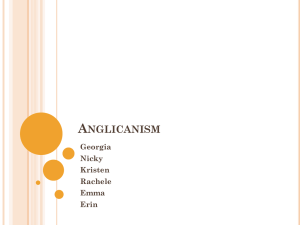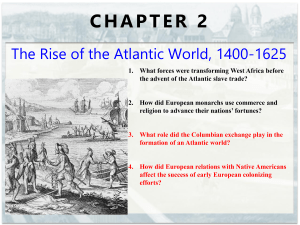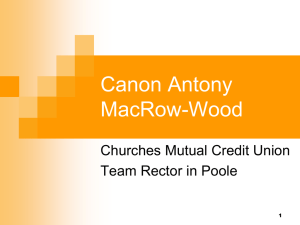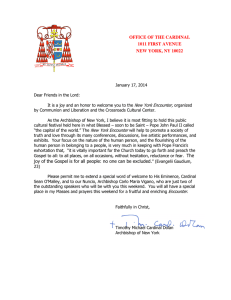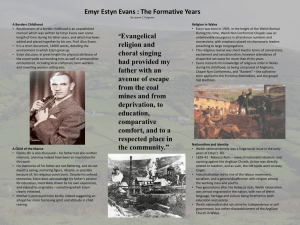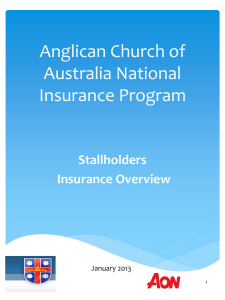Being Anglican
advertisement
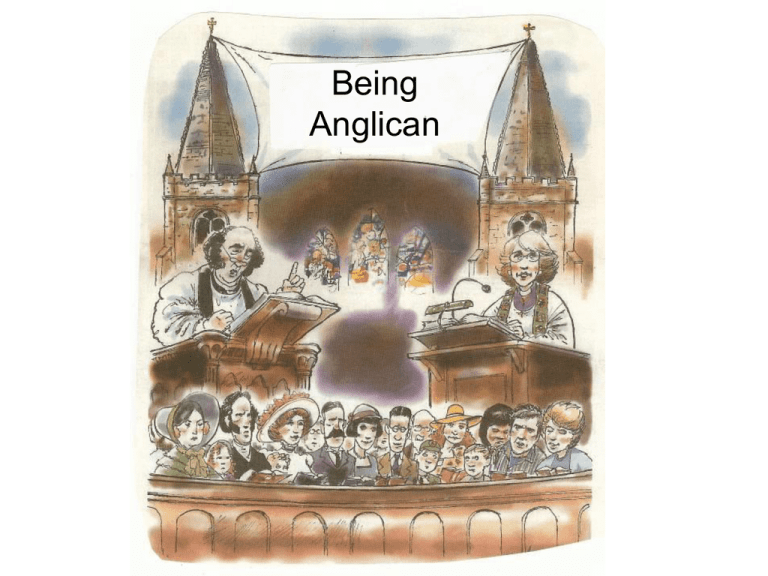
Being Anglican A Power Point presentation composed by the Anglican Schools Office for use by the schools within the Anglican schools network, and any other educational body which may find the material helpful. Christianity is a world-wide religion that began in the area of Galilee, in Israel, about 2000 years ago. Christians try to live in a way that copies the lifestyle of Jesus of Nazareth. They worship God in different ways in many different churches (denominations). The first people Jesus taught were Jews. But after his death and resurrection his followers told other races who lived round the Mediterranean area all about his teachings, and Christian churches began to appear in many different countries. Each church group was slightly different. The Christians in Europe were led by the Archbishop in Rome: the Pope. The Christians in the East were led by the Archbishop in Constantinople: the Patriarch. Christian ideas were taken to the Celts and Saxons in Britain by the Romans. Christians in Britain had close links with the church leaders in Rome for hundreds of years. The world wide Anglican Church has grown out of the Church of England, which broke away from the Pope’s authority during the Reformation in the 16th Century. King Henry VIII cut England’s ties with the Pope because the Pope would not allow him to divorce his first wife, but he was not a theological reformer. It was his Archbishop of Canterbury; Archbishop Cranmer, who reformed the Church of England through writing the Book of Common Prayer. It was Queen Elizabeth I who ensured that the changes would be permanent, and by the end of her reign the Church of England (later called the Anglican church) was the national and “established” faith. “Established” church means that in the United Kingdom the Anglican Church is supported by the government, and the monarch is the Head of the Church. Religious Education is taught in all State schools. The Anglican Church is not Established in any other country. Wherever the English settled in the world they took the Anglican way of worship with them. The Victorians had some very romantic ideas about spreading the English version of Christianity to the world….. .......as the British Empire spread Education ? Conversion ? Subjugation ? Christianity came to New Zealand in the 19th century. The first mission stations were all in the Bay of Islands. The first missionaries were Englishmen from the Anglican Church. Anglican missionaries came to the Pacific Islands at the same time as they sailed to New Zealand and Australia. The Rev Samuel Marsden, an Anglican priest; the driving force behind the first Christian mission in New Zealand. The Rev Samuel Marsden’s first church service in the Bay of Islands depicted on stamps. The mission settlement at Keri Keri was established by Marsden in 1819. The Rev Henry Williams arrived with his family in 1823 and settled in Paihia. He became the leader of the English (Anglican) missionaries. The first Maori to be baptised a Christian was a chief in Waitangi called Christian Rangi. He was baptised by the Anglican missionaries on 11th September, 1825. Anglican missionaries were closely involved with the writing of the Treaty of Waitangi. The home of the British Resident, James Busby, where the Treaty of Waitangi was signed on 6th February 1840. The Church of The Holy Redeemer, Levuka. The oldest Anglican Church in Fiji. The first primary schools in New Zealand were run by Anglican missionaries for Maori children. Christ’s College, 1850 Wanganui Collegiate School, 1854 Three of the oldest Anglican Secondary Schools in the country. Te Aute College, 1854 The Anglican Church in Aotearoa, New Zealand and Polynesia operates in 3 cultural strands. The badge of the Anglican Church in Aotearoa, New Zealand and Polynesia. There are thousands of people working within the Anglican church, in many different ministries. The clergy are the Bishops, Priests, and Deacons, who have been ordained for ministry… The laity are the community, or congregation of Anglicans that worship together in an Anglican church. Sometimes the laity share the leadership of the worship with the priest. A Synod is the decision-making body of the church, which meets annually. Every 2 years the 3 Tikanga meet at the General Synod/ te Hinota Whanui. All synods are made up of the Bishops, clergy, and laity. The 3 co-presiding Bishops in our Anglican Church of Aotearoa, New Zealand and Polynesia are called Archbishops. The Anglican Church employs hundreds of people to carry out administrative and pastoral work throughout the 3 Tikanga……. The Archbishop of Canterbury is the most senior Bishop in the worldwide Anglican Church. The current one is the 104th Like all other Christians, people join the Anglican church by being baptised. The main Sunday service in Anglican churches is a Eucharist – the family meal of the church, where the life, death and resurrection of Christ is remembered. Anglicans mark different seasons and festivals through the year by the Bible Readings that are set down to be read in the Lectionary, changing the decorations in the church, the vestments worn by the clergy, the colours of altar hangings and pulpit falls, the flowers used and the music sung. Anglicans hold their faith and read the Bible from a standpoint of respecting •Scripture •Tradition •Reason Anglicans are united by their use of The Prayer Book when they worship. A New Zealand Prayer Book He Karakia Mihinare o Aotearoa Anglicans use a set of questions and answers, called the Catechism, to explain the teachings (doctrine) of the church. For example: Question: Where do we learn about God? Answer: Christians learn about God in the Bible, in the teaching of the Church summed up in the Apostles’ and Nicene Creeds, and through sharing in the living community of faith. The Compass Rose is the symbol of the world-wide Anglican communion. There are 44 member churches throughout the world. They are united by 4 “instruments of unity” •The Archbishop of Canterbury •The Lambeth Conference •The Primates Meeting •The Anglican Consultative Council The Anglican Church is one branch (denomination) of the Christian faith. Like all Christians, Anglicans try to live in a loving community so that God’s purpose for the whole creation will be fulfilled.
